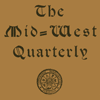
Mid-West Quarterly (1913–1918)
Date of this Version
1914
Document Type
Article
Abstract
It is now pretty generally known that Abraham Lincoln, whose schooling, according to his own statement, amounted in all to somewhat less than a year, was not only a steady reader and admirer of Shakespeare but also one of the keenest critics of some of the tragedies. His brief remarks on the opening lines of Richard III, protesting against the rhetorical rendering so dear to most actors, are not surpassed, for insight and sympathy, by the best criticism of Lamb and Coleridge, and his expressed preference for Claudius's soliloquy to the more famous "To be or not to be," shows the courage of true conviction, quite uninfluenced by the conventional view. That Lincoln took his Shakespeare to heart is clearly shown by the pathetic story of his reading the lines of Constance on Prince Arthur and his application of the mother's grief to his own recent bereavement in the death of Willie. His several references to Hamlet's reflections on fate, occurring especially in conversations, are still more characteristic; and it is this, the most popular of Shakespeare's tragedies - with the possible exception of Lincoln's favorite, Macbeth - which suggests the following comparison.


Comments
Published in THE MID-WEST QUARTERLY Vol. 1, No. 3 (April 1914).